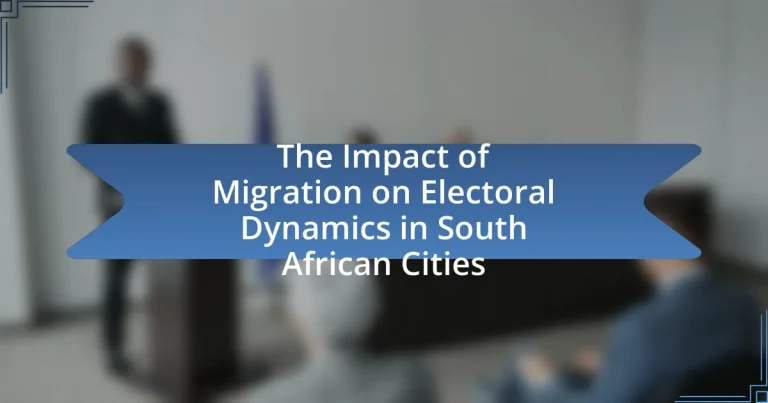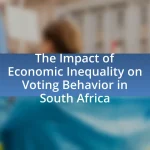The article examines the impact of migration on electoral dynamics in South African cities, highlighting how the influx of migrants alters voter demographics and political preferences. It discusses key demographic changes, such as increased diversity and shifts in age structure, which influence electoral outcomes and party strategies. The article also addresses the challenges migrants face in the electoral process, including legal barriers and socio-economic conditions, and explores how political parties adapt their strategies to engage with migrant voters. Additionally, it emphasizes the importance of understanding migration trends for enhancing electoral participation and representation in urban areas.
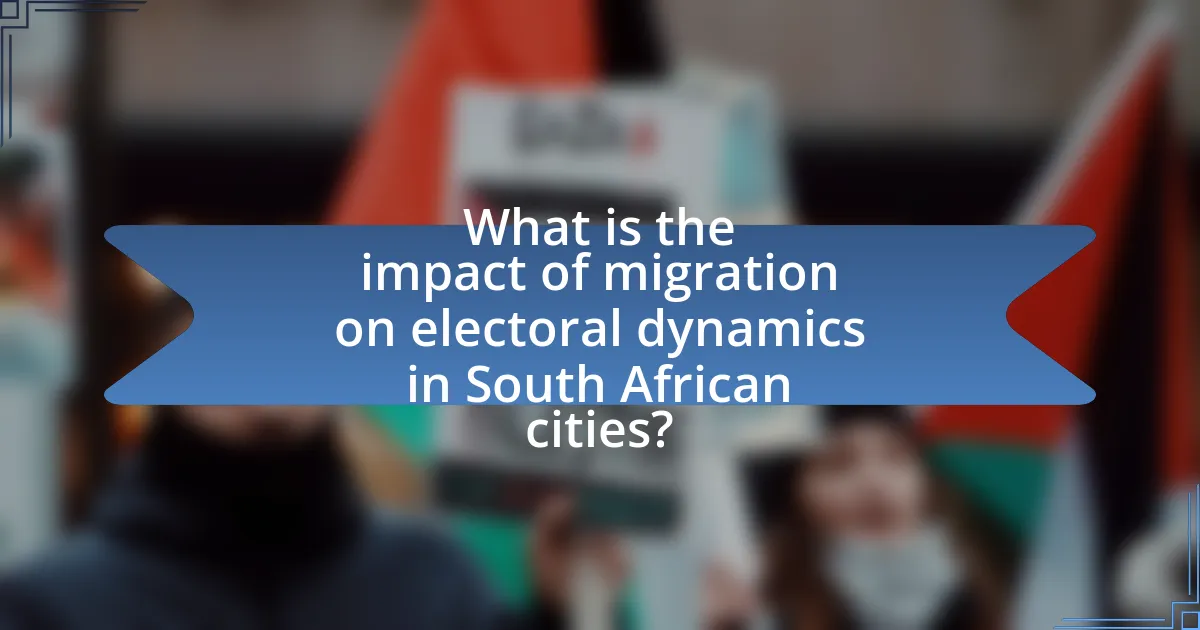
What is the impact of migration on electoral dynamics in South African cities?
Migration significantly influences electoral dynamics in South African cities by altering voter demographics and political preferences. As migrants, particularly from rural areas and neighboring countries, settle in urban centers, they contribute to a more diverse electorate, which can shift the balance of power among political parties. For instance, the influx of migrants has been linked to increased support for parties that advocate for social services and economic opportunities, reflecting the needs of these new residents. Research indicates that areas with higher migrant populations often experience changes in voting patterns, as seen in the 2019 national elections where urban constituencies with significant migrant communities showed different electoral outcomes compared to more homogenous areas. This demographic shift can lead to increased competition among political parties, prompting them to address the concerns of a broader electorate, thereby reshaping policy agendas and campaign strategies.
How does migration influence voter demographics in urban areas?
Migration significantly alters voter demographics in urban areas by introducing diverse populations with varying political preferences and social needs. This influx of migrants often leads to shifts in voting patterns, as new residents may prioritize different issues such as housing, employment, and social services compared to long-term residents. For instance, in South African cities, the arrival of migrants from rural areas or other countries has been shown to impact local elections, as these groups may support candidates who advocate for inclusive policies and social justice. Research indicates that areas with high migration rates often experience increased voter turnout and engagement, reflecting the new demographic’s desire to influence local governance and policy-making.
What are the key demographic changes resulting from migration?
Key demographic changes resulting from migration include shifts in population size, diversity, age structure, and urbanization. Migration often leads to an increase in population density in urban areas, as seen in South African cities where migrants contribute significantly to the growth of metropolitan regions. This influx enhances cultural diversity, introducing various ethnic groups and languages, which can influence social dynamics and electoral behavior. Additionally, migrants tend to be younger, impacting the age structure of the population and potentially increasing the labor force. For instance, the 2011 South African Census indicated that a substantial portion of the population growth in cities like Johannesburg and Cape Town was attributed to internal and international migration, highlighting these demographic shifts.
How do these demographic changes affect electoral outcomes?
Demographic changes significantly influence electoral outcomes by altering the composition of the electorate. In South African cities, increased migration has led to a more diverse population, which can shift voting patterns and preferences. For instance, the influx of migrants often results in a higher proportion of younger voters who may prioritize different issues, such as employment and housing, compared to older, more established residents. This shift can lead to the emergence of new political parties or the reconfiguration of existing ones to appeal to these changing demographics. Evidence from the 2019 South African elections indicates that areas with higher migrant populations saw increased support for parties that addressed issues relevant to these communities, demonstrating a direct correlation between demographic changes and electoral outcomes.
Why is understanding migration important for electoral politics?
Understanding migration is crucial for electoral politics because it significantly influences voter demographics and political preferences. In South African cities, for instance, the influx of migrants alters the composition of the electorate, often leading to shifts in party support and policy priorities. Research indicates that areas with high migrant populations tend to have different voting patterns compared to more stable communities, as migrants may prioritize issues such as job creation, housing, and social services. This dynamic was evident in the 2019 national elections, where parties that addressed migration-related concerns gained substantial support in urban areas with significant migrant communities. Thus, comprehending migration trends allows political parties to tailor their strategies and policies effectively to engage diverse voter bases.
What role does migration play in shaping political representation?
Migration significantly influences political representation by altering demographic compositions and voting patterns in South African cities. As migrants settle in urban areas, they often bring diverse perspectives and needs that can reshape local political agendas. For instance, the influx of migrants can lead to increased representation demands, prompting political parties to address issues pertinent to these communities, such as housing, employment, and social services. Research indicates that areas with high migrant populations often see shifts in electoral outcomes, as political candidates adapt their platforms to appeal to these new constituents, thereby enhancing the overall political representation of diverse groups within the electorate.
How does migration affect party strategies during elections?
Migration significantly influences party strategies during elections by altering voter demographics and preferences. Political parties often adapt their platforms and outreach efforts to address the needs and concerns of migrant populations, which can include issues such as housing, employment, and social services. For instance, in South African cities, the influx of migrants has led parties to focus on inclusive policies that resonate with both local and migrant voters, thereby expanding their electoral base. Research indicates that parties that effectively engage with migrant communities can increase their support, as seen in the 2019 South African elections where parties that addressed migration-related issues gained traction among diverse voter groups.
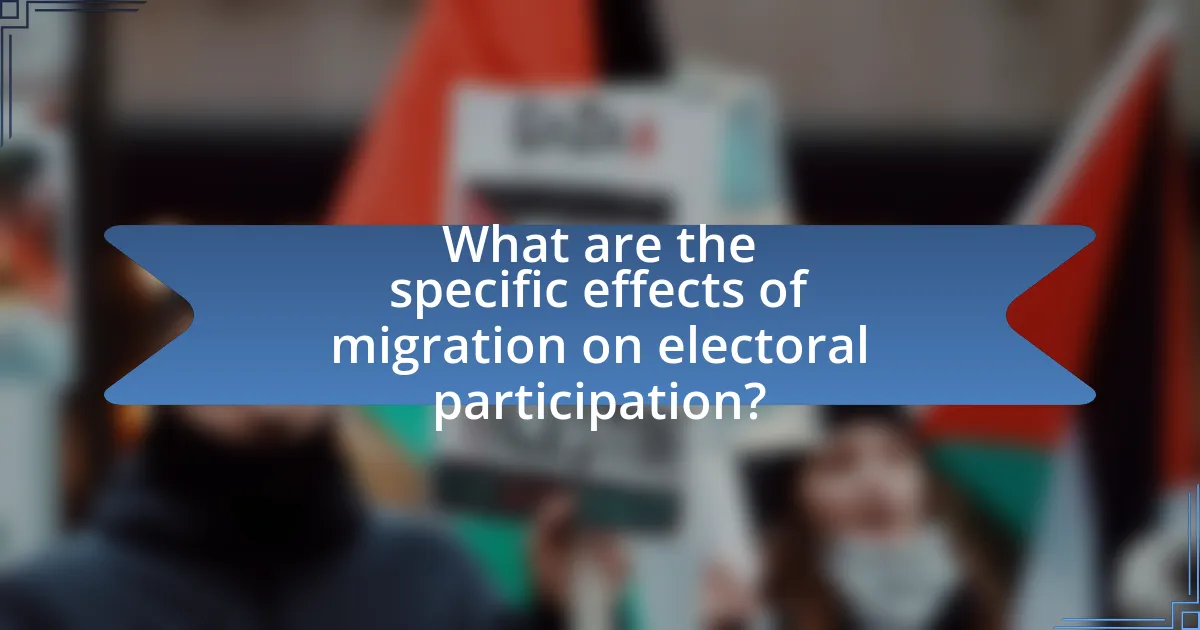
What are the specific effects of migration on electoral participation?
Migration significantly affects electoral participation by altering voter demographics and influencing political engagement. Migrants often bring diverse perspectives and priorities, which can lead to shifts in voting patterns and party support. For instance, research indicates that areas with high migrant populations may experience increased voter turnout due to the mobilization of community organizations advocating for immigrant rights and representation. Additionally, studies show that migrants may face barriers to participation, such as language difficulties and lack of awareness about the electoral process, which can suppress their voting rates. In South Africa, the influx of migrants has been linked to both increased political activism and challenges in integrating these populations into the electoral system, highlighting the complex relationship between migration and electoral dynamics.
How does migration impact voter turnout in South African cities?
Migration significantly impacts voter turnout in South African cities by altering the demographic composition and political engagement of the electorate. As individuals migrate, they often bring different political preferences and levels of civic participation, which can either enhance or diminish overall voter turnout. For instance, research indicates that areas with high levels of internal migration, such as urban centers, may experience increased voter turnout due to the influx of younger, more politically active populations. Conversely, migration can also lead to lower turnout if new residents are less engaged or face barriers to participation, such as lack of information or resources. Studies, including those by the Electoral Commission of South Africa, show that urban areas with diverse migrant populations often see fluctuating voter engagement, reflecting the complex relationship between migration and electoral participation.
What factors influence the voting behavior of migrants?
The voting behavior of migrants is influenced by factors such as socio-economic status, cultural background, political awareness, and integration into the host society. Socio-economic status affects access to information and resources, which can shape voting preferences. Cultural background plays a role in aligning migrants with specific political parties that resonate with their values and experiences. Political awareness, often influenced by education and community engagement, determines how informed migrants are about the electoral process and candidates. Integration into the host society can lead to a greater sense of belonging and civic responsibility, impacting their likelihood to vote. Studies have shown that these factors collectively shape the electoral choices of migrants, reflecting their unique experiences and challenges in the new environment.
How do socio-economic conditions affect electoral participation among migrants?
Socio-economic conditions significantly influence electoral participation among migrants by affecting their access to resources, information, and civic engagement opportunities. For instance, migrants with higher income levels and stable employment are more likely to participate in elections due to increased access to transportation, information about the electoral process, and a sense of community belonging. Conversely, those facing economic hardships often experience barriers such as lack of time, financial constraints, and limited access to voter education, which can lead to lower participation rates. Research indicates that in South Africa, socio-economic disparities among migrants contribute to varying levels of electoral engagement, with studies showing that economically disadvantaged migrants are less likely to vote compared to their more affluent counterparts.
What challenges do migrants face in the electoral process?
Migrants face significant challenges in the electoral process, including legal barriers, lack of access to information, and social exclusion. Legal barriers often arise from restrictive voting laws that may prevent non-citizens from participating in elections, limiting their ability to influence political outcomes. Additionally, many migrants struggle to access reliable information about the electoral process, including registration requirements and voting procedures, which can hinder their participation. Social exclusion, stemming from discrimination or marginalization within host communities, further complicates their engagement in the electoral process. These challenges collectively diminish the political voice of migrants in South African cities, impacting the overall electoral dynamics.
How do legal and bureaucratic barriers affect migrant voting rights?
Legal and bureaucratic barriers significantly restrict migrant voting rights by imposing complex registration processes and eligibility criteria that often exclude non-citizens. In South Africa, for instance, migrants face challenges such as the requirement for proof of residency and citizenship documentation, which many may lack or find difficult to obtain. According to the Electoral Commission of South Africa, these barriers can lead to disenfranchisement, as migrants may not be aware of their voting rights or may find the bureaucratic processes too daunting to navigate. Consequently, these obstacles hinder the political participation of migrants, affecting the overall electoral dynamics in urban areas where they reside.
What are the implications of these challenges for electoral engagement?
The implications of challenges related to migration for electoral engagement in South African cities include decreased voter participation and increased polarization among communities. These challenges can lead to feelings of disenfranchisement among migrants, who may perceive electoral processes as unresponsive to their needs, resulting in lower turnout rates. Additionally, tensions between local and migrant populations can exacerbate divisions, making it difficult to foster inclusive political dialogue. Research indicates that areas with high levels of migration often experience heightened competition for resources, which can further alienate voters and diminish trust in electoral institutions.
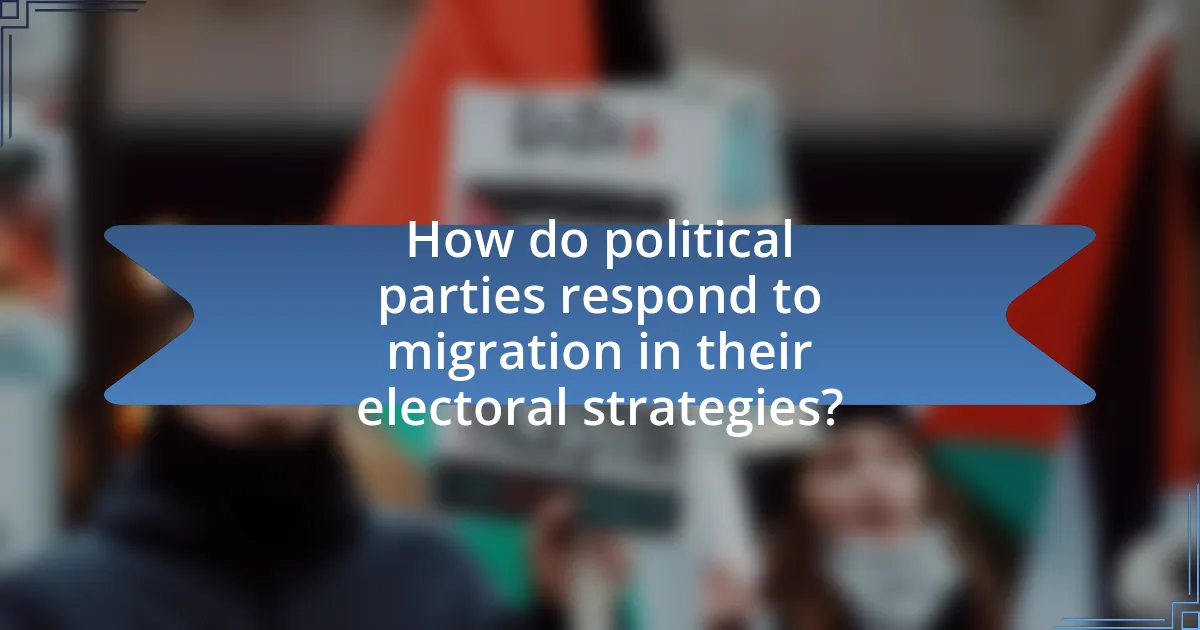
How do political parties respond to migration in their electoral strategies?
Political parties in South Africa respond to migration in their electoral strategies by adjusting their platforms to address the concerns and interests of both local and migrant populations. For instance, parties may adopt pro-immigration stances to attract votes from migrant communities, emphasizing inclusivity and social cohesion. Conversely, they may also leverage anti-immigration rhetoric to appeal to local voters who perceive migrants as competition for jobs and resources. This dual approach is evident in the African National Congress (ANC) and the Economic Freedom Fighters (EFF), which have both tailored their messages to resonate with different voter segments, reflecting the complex dynamics of migration in urban areas. Research indicates that parties that effectively engage with migration issues can enhance their electoral appeal, as seen in the 2019 elections where migration-related policies influenced voter preferences significantly.
What strategies do political parties employ to engage migrant voters?
Political parties employ targeted outreach, inclusive policy proposals, and community engagement initiatives to engage migrant voters. These strategies include organizing events in migrant communities, providing multilingual materials, and addressing specific concerns such as immigration policies and social services. For instance, the African National Congress (ANC) has been known to hold community meetings in areas with high migrant populations to discuss issues relevant to these voters, thereby fostering a sense of inclusion and representation. Additionally, research indicates that parties that actively involve migrant leaders in their campaigns can enhance trust and mobilization among migrant communities, as seen in various electoral cycles in South Africa.
How do parties tailor their messages to resonate with migrant communities?
Parties tailor their messages to resonate with migrant communities by emphasizing shared values, addressing specific concerns, and utilizing culturally relevant communication strategies. For instance, political parties often highlight issues such as job creation, access to services, and social integration, which are particularly relevant to migrants. Additionally, they may employ multilingual campaigns and engage community leaders to foster trust and ensure their messages are culturally sensitive. Research indicates that parties that effectively communicate in the languages spoken by migrant populations and address their unique challenges can significantly increase their support within these communities, as seen in the 2019 South African elections where parties that focused on migrant rights gained traction.
What role do community organizations play in mobilizing migrant voters?
Community organizations play a crucial role in mobilizing migrant voters by providing resources, information, and support that facilitate electoral participation. These organizations often engage in outreach efforts to educate migrants about their voting rights and the electoral process, which is essential given that many migrants may be unfamiliar with local voting regulations. For instance, studies have shown that community organizations can increase voter turnout among migrants by up to 20% through targeted campaigns and assistance in navigating registration and polling procedures. Additionally, they create a sense of community and belonging, which encourages migrants to participate in the democratic process, thereby influencing electoral dynamics in South African cities.
How does migration shape party competition in urban elections?
Migration significantly influences party competition in urban elections by altering demographic compositions and voter preferences. As migrants settle in urban areas, they often bring diverse political views and needs, which can shift the electoral landscape. For instance, in South African cities, the influx of migrants has led to increased competition among political parties as they seek to address the unique concerns of these new constituents, such as housing, employment, and service delivery. This dynamic is evidenced by the rise of parties that specifically advocate for migrant rights and issues, thereby reshaping traditional party alignments and strategies in urban electoral contests.
What impact does migration have on the emergence of new political parties?
Migration significantly influences the emergence of new political parties by altering demographic compositions and shifting political priorities. In South African cities, increased migration has led to diverse populations that often feel underrepresented by existing political entities. This demographic change creates opportunities for new parties to form, focusing on issues pertinent to migrants, such as housing, employment, and social services. For instance, the rise of parties like the Economic Freedom Fighters (EFF) can be partially attributed to the growing discontent among marginalized groups, including migrants, who seek representation that addresses their unique challenges. This trend is supported by research indicating that areas with high migration rates often see a proliferation of political movements aimed at advocating for the rights and needs of these communities.
How do established parties adapt to the changing electoral landscape due to migration?
Established parties adapt to the changing electoral landscape due to migration by modifying their policies, outreach strategies, and candidate selection to better resonate with diverse voter bases. For instance, in South Africa, parties have increasingly focused on issues pertinent to migrant communities, such as housing, employment, and social services, to attract these voters. Research indicates that the African National Congress (ANC) and the Democratic Alliance (DA) have both adjusted their platforms to include more inclusive language and policies that address the needs of migrants, reflecting the demographic shifts in urban areas. This adaptation is crucial as cities like Johannesburg and Cape Town experience significant population changes due to migration, influencing electoral outcomes and party strategies.
What best practices can be adopted to enhance electoral participation among migrants?
To enhance electoral participation among migrants, best practices include providing accessible information about the electoral process in multiple languages and ensuring that registration processes are simplified and well-publicized. Research indicates that language barriers significantly hinder participation; for instance, a study by the International Organization for Migration found that migrants are more likely to vote when they receive information in their native languages. Additionally, community outreach programs that engage migrants through local organizations can foster a sense of belonging and encourage participation. Evidence from various electoral studies shows that targeted outreach increases voter turnout among migrant populations, demonstrating the effectiveness of these practices.
How can voter education initiatives be tailored for migrant populations?
Voter education initiatives can be tailored for migrant populations by providing multilingual resources and culturally relevant information. These initiatives should address the specific legal rights and voting processes applicable to migrants, ensuring that materials are accessible in the languages spoken by the migrant communities. For instance, the Electoral Commission of South Africa has recognized the importance of language accessibility, offering voter education in multiple languages to accommodate diverse populations. Additionally, partnerships with local organizations that serve migrants can enhance outreach and engagement, fostering trust and understanding of the electoral process.
What role can technology play in facilitating migrant electoral engagement?
Technology plays a crucial role in facilitating migrant electoral engagement by providing accessible platforms for information dissemination and participation. Digital tools such as mobile applications, social media, and online voting systems enable migrants to stay informed about electoral processes, candidates, and voting rights. For instance, the use of social media platforms has been shown to increase awareness among migrant communities about upcoming elections and voter registration deadlines, as evidenced by studies indicating that 70% of migrants utilize social media for information related to civic engagement. Additionally, online platforms can simplify the registration process, allowing migrants to register to vote remotely, which is particularly important for those who may face barriers in accessing traditional registration methods.
